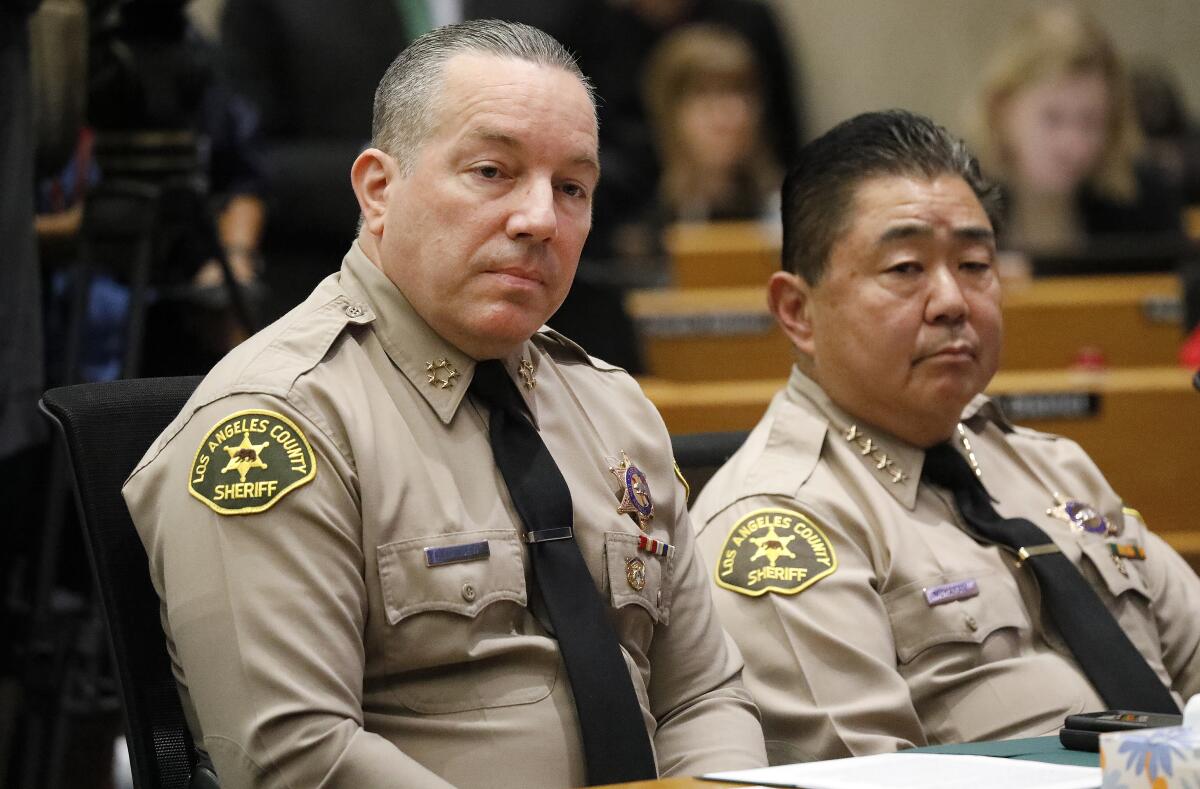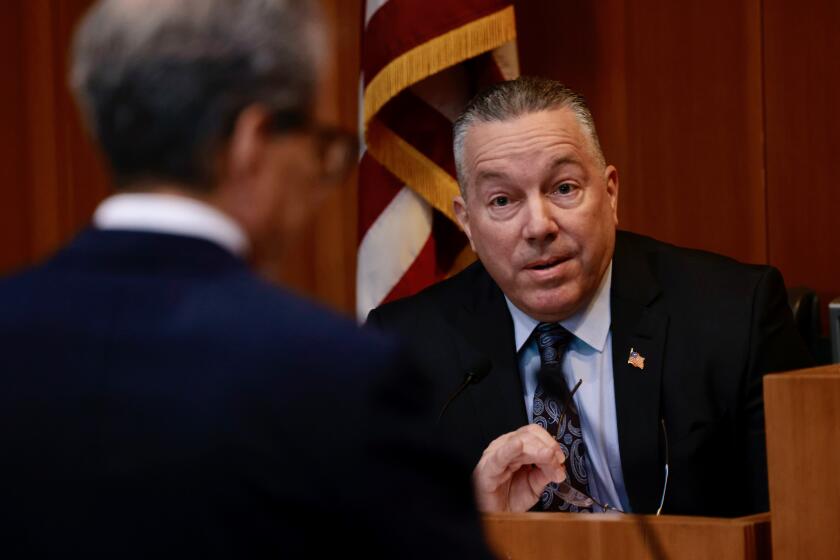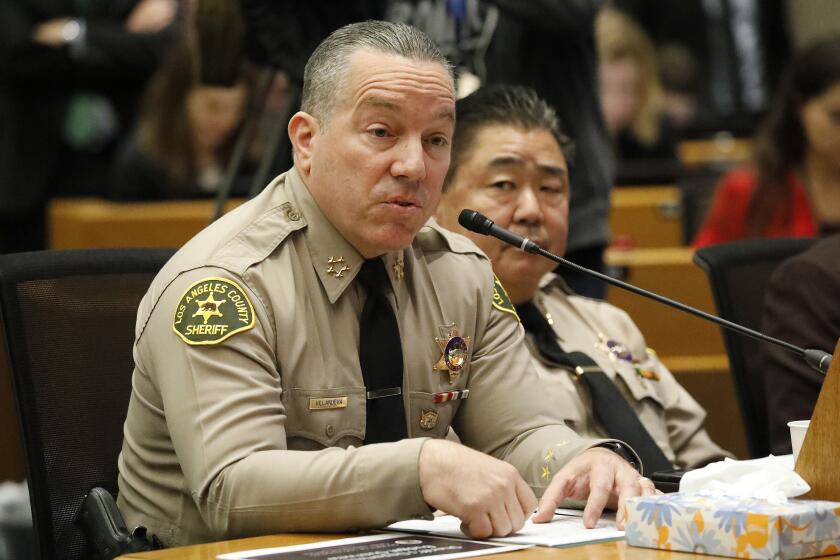Ex-undersheriff admits to having alleged deputy gang tattoo — then getting rid of it

- Share via
It was a Caveman, and it was on his ankle.
After more than two years of resisting subpoenas to testify about deputy gangs within the Los Angeles County Sheriff’s Department, this week former Undersheriff Tim Murakami admitted under oath that he once sported a tattoo representing the Cavemen, a controversial subgroup affiliated with the East Los Angeles station.
When asked whether former Sheriff Alex Villanueva — who made Murakami his No. 2 a few months after taking office — knew about the ink, Murakami replied: “I believe that he did.”
The admission marks the first time the department’s former second-in-command has publicly confirmed long-standing rumors about his tattoo, which he said has since been covered up or removed.
“It’s no longer there,” he told the small group of spectators who showed up to watch his testimony at Loyola Law School as part of the Civilian Oversight Commission’s 11th special hearing on deputy gangs.
Over the course of four hours, Murakami admitted to knowing about at least half a dozen tattooed groups, including the Cavemen, the Indians, the Banditos, the Little Red Devils, the Grim Reapers and the Jump Out Boys — some of which he said still exist within the Sheriff’s Department.
But he could not independently remember the name of a single tattooed deputy, and he bristled at the idea of calling the groups “deputy gangs,” even after one commissioner pointed out that state penal code uses the term “gangs” to describe rogue law enforcement groups. Repeatedly, Murakami insisted that the tattoos symbolize hard work and “station pride” and that there was “no nefarious connotation” to having deputy subgroups operate inside the department.
“The intent of the deputies involved is not anything bad, but the way it’s being perceived now, it is detrimental,” he said, speaking about the tattooed groups. And about the ink itself, he said, “That’s why, if people have one, I recommend they remove them.”
To commission Chair Sean Kennedy, the former undersheriff’s admissions were both a success for oversight officials and an indication that the department has an “inherent conflict of interest” when it comes to investigating deputy gangs when so many officials have subgroup tattoos themselves.
“After dodging the issue for years, Mr. Murakami under oath finally had to admit that he is a tattooed Caveman, and that more recently he altered his ankle tattoo to escape detection,” Kennedy told The Times on Thursday evening. “He is the third undersheriff to date to admit having one of these tattoos.”
Though he showed up late, Murakami’s time on the stand was less chaotic and yielded more information than the commission’s last deputy gang hearing in January, which featured several hours of combative testimony from Villanueva, who frequently insulted oversight officials and was regularly interrupted by jeers and cheers from the audience.
In an emailed response late Thursday, the former sheriff did not directly address the question about whether he knew about Murakami’s tattoo.
“I was concerned with conduct, not tattoos,” he wrote. “The staffing crisis within the LASD is threatening public safety, and chasing phantom deputy gangs is not going to improve recruitment.”
For five decades, the Sheriff’s Department has been plagued by allegations about tattooed groups of deputies running roughshod over certain stations and promoting a culture of violence. The groups are commonly known by names such as the Executioners, the Banditos, the Regulators and the Little Devils, and members typically have matching, sequentially numbered tattoos featuring macabre imagery.
During his testimony, Murakami said that he got his ink at a tattoo shop on Whittier Boulevard sometime in the 1980s, when he worked at the East Los Angeles station.
“It was essentially a caveman carrying a club,” he said. “It had ELA for East Los Angeles either across the stomach or the chest.”
The image also featured the number 10, which Murakami said indicated that he was the 10th deputy to get that tattoo.
There were six to 10 other deputies at the shop with him the day he got inked, he said, though on Thursday he could not remember any of their names. He was also unable to remember the name of the person who invited him to get the tattoo. At one point, he said he’d never actually seen another deputy with the Caveman ink at the station — a claim that sparked an angry outburst from one commissioner.
During the four years he spent at East Los Angeles, Murakami said, he worked general patrol and on the gang suppression team, which drew a pointed question from Anthony Pacheco, the commission’s special counsel.
“So when you had a Caveman tattoo on your ankle you worked in gang suppression?” Pacheco asked.
Murakami confirmed that he did.
The tattoo symbolized “station pride, and being recognized as a hardworking deputy,” Murakami added.
The latest watchdog report comes as another deputy gang-related lawsuit hits the L.A. Sheriff’s Department.
The former undersheriff also testified about the existence of two other tattooed groups at the East Los Angeles station — the Banditos and the Little Red Devils. He said that he was not a member of either, and that of the three East L.A. groups, only the Banditos still had members in the department.
After his early years in East Los Angeles, Murakami transferred to the City of Industry sheriff’s station, where he spent most of his career.
The station is home to a group known as the Industry Indians, whose existence first became public this year after Times reporting showed two suspected members were fired after a violent confrontation with a group of teenagers outside a bowling alley in Montclair called the Bowlium. The teens have since filed suit.
Though on Thursday Murakami admitted to knowing about the group, he said that he’d never actually seen an Indians tattoo and that, if he had, he would not have done anything about it. He said he believed that there were still some deputies with Indians tattoos at the station but he could not remember their names.
He said he did not learn of the Bowlium brawl until after he retired, when he read about it in the news.
Though he answered dozens of questions about his tattoo and the East Los Angeles subgroup, at the advice of his attorney, Murakami refused to provide any details about another tattoo that he has.
“I’ll admit that I do have a tattoo,” he said when asked about any other ink he might have. “It’s a private matter and nothing to do with the Sheriff’s Department.”
Thursday’s testimony was several years in the making, and it came as part of the commission’s long-standing efforts to examine violent, tattooed cliques of deputies allegedly operating as gangs within the Sheriff’s Department.
Last year, the commission’s special counsel issued a 70-page report condemning the “cancer” of deputy gangs and urging Sheriff Robert Luna to create a stronger policy banning the groups.
The report’s findings relied heavily on testimony from a series of public hearings, many of which involved witnesses testifying under oath. The commission sought testimony from both Murakami and Villanueva, but — until recently — both refused to comply with repeated subpoenas.
During combative testimony to the Civilian Oversight Commission, former Sheriff Alex Villanueva attempts to minimize the problem of deputy gangs.
In late 2023, after several years of sparring with the county’s lawyers in court, Villanueva finally agreed to testify before the commission under oath. During a four-hour hearing in January, the former sheriff repeatedly denied the existence of deputy gangs. He said he’d never systematically investigated them and admitted that he did not question his top leaders about their involvement in the secretive subgroups.
For years, Murakami also fought oversight officials’ subpoenas, at least once citing a scheduling conflict and more frequently citing medical problems.
Lawyers for the county accused him of using delay tactics, alleging in a January court filing that Murakami “simply does not want to submit to examination” by the commission. In February, Superior Court Judge Anne Richardson ordered Murakami to obey the subpoenas.
After four decades in the Sheriff’s Department, Murakami leaped up the ranks after Villanueva took office in 2018. At the time, Murakami was the captain overseeing the City of Industry sheriff’s station. Then, Villanueva promoted him three ranks at once, making him one of the department’s assistant sheriffs.
In that role, Murakami was one of three department executives Villanueva appointed to his controversial “truth and reconciliation” panel, which was created to reevaluate disciplinary decisions made under earlier administrations. In early 2019, the panel sparked an outcry after its reevaluation of a case paved the way for Villanueva to rehire a deputy who’d been fired in connection with allegations of domestic abuse and stalking.
A few months later, Villanueva abruptly removed his second-in-command, then-Undersheriff Ray Leyva, and installed Murakami in his stead.
Undersheriff Tim Murakami was accused of referring to employees of color using a Japanese slur, according to interviews and records obtained by The Times.
At one point, it appeared Murakami’s position could have been in peril when the County Equity Oversight Panel recommended in 2020 that he be disciplined for allegedly using a Japanese racial slur to refer to employees of color. But Murakami, who is Japanese American, denied the accusation, and ultimately Villanueva rejected the panel’s recommendation.
On Thursday, Murakami was asked questions about those allegations under oath, but he refused to answer after his lawyer argued that records about the matter were not considered public. A lawyer for the county explained that they were, but Murakami still refused to answer questions about them and his lawyer maintained that publishing them would be a “violation of law.”
Afterward, Kennedy told The Times that the commission will now have to decide whether to seek a court order requiring Murakami to answer questions about the equity panel’s findings.
More to Read
Sign up for Essential California
The most important California stories and recommendations in your inbox every morning.
You may occasionally receive promotional content from the Los Angeles Times.














